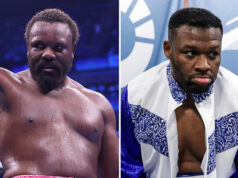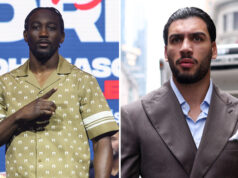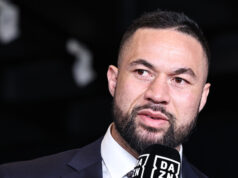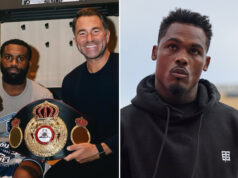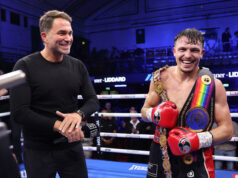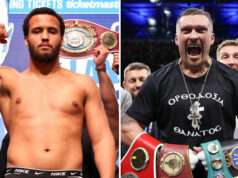When Fighters Should Say When, and When Fans Should Too
With Rafael Marquez’ 3rd round stoppage of Israel Vazquez Saturday night, he has evened the score in their amazing four-fight rivalry. This rivalry and Kieran Mulvaney’s ESPN podcast from last week caused me to ponder the issue of a fighter’s legacy versus their long term health.
Mulvaney raised a similar issue. He reminisced about the Diego Corrales vs. Jose Luis Castillo bout in 2005 which many people, including myself, consider the greatest fight they ever witnessed. Mulvaney made a few noteworthy observations: neither fighter was ever the same after their classic confrontation and fight fans love boxing but hate what it does to the combatants.
We want the best fighters to chase after legacy but do we really consider or appreciate the risks involved in such an undertaking? I read the boxing mailbags every week where fans love to discuss the legacy of great fighters but rarely mention how many of them were irreparably damaged in the ring. Joe Louis, Ray Robinson, Muhammad Ali immediately come to mind.
Interestingly, even though the Vazquez/Marquez rivalry is being compared to the greatest rivalries in the sport such as Robinson vs. Jake LaMotta, Ted Lewis vs. Jack Britton, and Willie Pep vs. Sandy Sadler, both fighters were dropped from the top ten pound-for-pound lists of most established experts long before Saturday night’s bout. They received no special consideration in spite of the fact that their second and third matches won fight of the year for 2007 and 2008. After the third fight, a razor-thin decision victory for Vazquez, it was widely acknowledged that both men needed a rest.
Though both scored stoppages in their lone fight in 2009 against limited opposition, the inactivity and the perceived decline in their ability to perform after three brutal wars has hurt their current standing. Saturday night’s victory may put Marquez back in the top ten.
The boxing community is a hard bunch to please and the fighter must take risk to perform up to standard. This is the only way legacy status can be achieved. I felt a tinge of this enormity when pictures of Vazquez appeared leading up to the fight showing his damaged right eye, a near career-ending injury courtesy of Marquez. It was his eyes that failed to hold up Saturday night. At least he received a good payday which will hopefully better help him enjoy his family and cherish the experience of having participated in a legendary rivalry, provided his physical and mental health hold up.
Boxing more than any other sport consists of athletes who earn a living by risking their lives to entertain people. Blows to the head during fights and sparring in preparation for those fights often have a debilitating effect on combatants especially when they get older. Most fighters spar well over 100 rounds before a fight (Shane Mosley reportedly spars upwards of 300). Head punches are the thing because they produce dramatic knockouts which generate excitement from fans sometimes leading to enormous popularity. It’s what Manny Pacquiao has done lately.
Philosophically speaking, boxing is organized disorder. Nazeem Richardson, Mosley’s trainer, spoke to this while preparing his charge for his fight with Mayweather. Richardson stated that boxing is a sport where the fighter is requesting his or her body to carry out something it was not designed for. It was quite interesting and paradoxical to hear Richardson advising Mosley between rounds in his fight against Antonio Margarito to “swim without getting wet.”
The primary purpose of the body is to serve as a vehicle for the soul as it journeys through life. Boxers as well as other athletes such as football players damage the very thing the soul requires to carry out its purpose. Despite this undeniable truth, modern day fighters still lack fundamental safeguards to help limit their risks such as a national boxing commission and up-to-date drug testing to ensure fighters are not getting punched in the head by juiced up opponents.
As much as I enjoy watching Floyd Mayweather’s ring brilliance or Pacquiao’s exuberant style, I’m glad they’re not engaging in 200 plus professional fights like Robinson and Archie Moore. When fans complain that Mayweather’s defensive first style is less exciting, I remind myself that boxing is a science with the aim of hitting your opponent without getting hit in return (swimming without getting wet) and I’ve learned to enjoy the pleasure of seeing such physical chess being played out in the ring.
Whenever Mayweather is speaking during an interview, I tell myself that this is exactly how clearly he should be speaking 20 years from now. As great as Sugar Ray Leonard was it may have been his 5 year respite from boxing at the height of his career initiated by a detached retina, courtesy of Tommy Hearns, that allows him to speak as well as he does today as opposed to some other past ring legends.
Many athletes, boxers included, profess love for their sport but the reality may be that what they call love is a dangerous attachment to something which prevents them from developing into a complete person. When their careers are over the attachment is broken and the internal disorder which boxing held at bay begins to manifest. This phenomenon happens time and time again. My hope is that the great fighters of today such as Mayweather and Pacquiao will not allow their egos to keep them from departing the sport before it takes too much from them.
If all human beings are in some way connected then to show sensitivity and love to fighters is to really only further love ourselves. When we watch a fight we are taking the time to share in an experience with other fans as well as the combatants. Our passion for boxing should never be divided from having concern for those who risks their lives to entertain us. So before we start talking about fight legacy and comparing today’s best against those of yesteryear, let us remember how brutal this sport is and hope that none of today’s great fighters live a post-fight life as did those legends from years ago.


